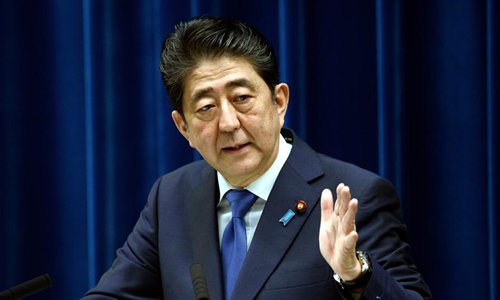HOME >> WORLD
Japan's Abe to cancel trip to Middle East amid rising tensions
Source:Xinhua Published: 2020/1/9 1:32:59

Japanese Prime Minister Shinzo Abe attends a press conference in Tokyo, Japan, on Sept. 25, 2017. (Xinhua)
Japanese Prime Minister Shinzo Abe will cancel a planned trip to the Middle East initially planned from Saturday amid the escalating tensions in the region, government sources said Wednesday.
The Japanese leader was planning to visit Saudi Arabia, the United Arab Emirates and Oman to explain and try to garner further understanding of Japan's contentious plan to dispatch Maritime Self-Defense Force (MSDF) personnel and hardware to the region.
The cancellation of Abe's trip comes amid a missile attack carried out by Iran on Iraqi bases hosting U.S. and coalition forces, with the strike believed to be a reprisal for the United States carrying out an airstrike last week which killed a top Iranian general, the sources said.
While the prime minister's trip will be cancelled, the government here said Wednesday that it still plans to dispatch an MSDF destroyer to the region in early February and patrol planes later this month, according to Japan's top government spokesperson Chief Cabinet Secretary Yoshihide Suga.
In late December, the Japanese Cabinet approved the dispatch of MSDF forces to the Middle East, despite political and public opposition to the move amid concerns over post-war military constraints restricting the nation's military activities constitutionally.
The planned deployment is to purportedly conduct "information-gathering" operations and others related to enhancing the safety of commercial shipping in the region, a key region for oil to reach resource-poor Japan.
Two P-3C patrol planes and a helicopter-carrying destroyer will be sent to the Middle East, along with around 260 MSDF personnel, to engage in a one-year survey and research mission, according to the government's plan.
Both opposition lawmakers and the public are opposed to the move, with Jun Azumi, the Diet affairs chief of the main opposition Constitutional Democratic Party of Japan calling on the government to scrap the highly divisive and contentious plan, in light of the latest escalation in tensions that could henceforth see the region become a potential war zone.
Azumi told reporters that the planned deployment should now be cancelled, calling the move preposterous under the current circumstances.
"It would be inconceivable to send troops amid heightened tensions," Azumi said, a sentiment backed by other opposition parties and the public, who have rallied outside the prime minister's office in staunch protest to the constitutionally ambiguous move.
Posted in: MID-EAST,ASIA-PACIFIC